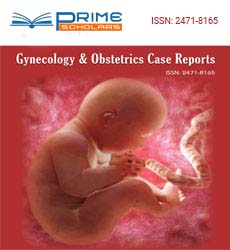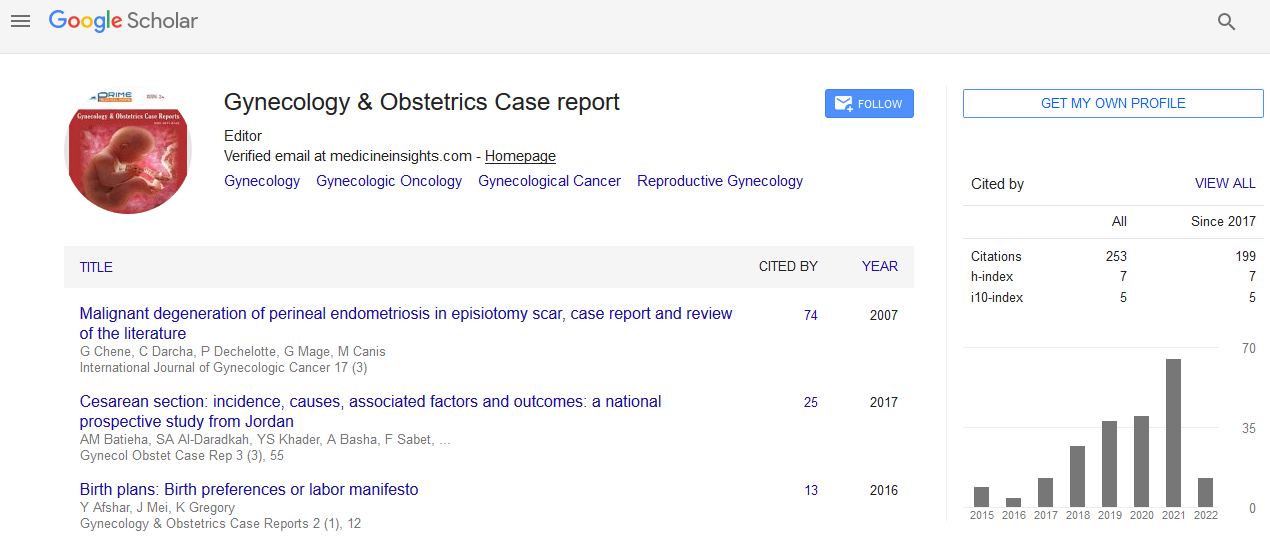Brief Report - (2025) Volume 11, Issue 2
Sexual Dysfunction in Women with Chronic Gynecologic Conditions: A Multidisciplinary Approach
Maria Vivian*
1Department of Reproductive Health, University of Toronto, Toronto, ON M5P 3L6,, Canada
*Correspondence:
Maria Vivian, Department of Reproductive Health, University of Toronto, Toronto, ON M5P 3L6,,
Canada,
Email:
Received: 24-Feb-2025, Manuscript No. ipgocr-25-22709;
Editor assigned: 26-Feb-2025, Pre QC No. ipgocr-25-22709(PQ);
Reviewed: 10-Mar-2025, QC No. ipgocr-25-22709(Q);
Revised: 17-Mar-2025, Manuscript No. ipgocr-25-22709(R);
Published:
24-Mar-2025
INTRODUCTION
Sexual dysfunction is a multifaceted issue that profoundly affects the quality of life in women, particularly those suffering from chronic gynecologic conditions. Disorders such as endometriosis, polycystic ovary syndrome (PCOS), chronic pelvic pain, uterine fibroids, Pelvic Inflammatory Disease (PID) and gynecologic cancers not only compromise physical well-being but also significantly influence emotional health, intimate relationships and sexual function. Women living with these chronic ailments often experience a range of sexual difficulties, including dyspareunia (pain during intercourse), reduced libido, arousal disorders, difficulties achieving orgasm and an overall dissatisfaction with sexual activity. Understanding and addressing the sexual health of these patients requires a comprehensive, multidisciplinary approach that integrates physical, psychological and relational dimensions of care [1].
The physical implications of chronic gynecologic conditions on sexual health are often the most immediate and recognizable. Endometriosis, for example, is associated with painful lesions and adhesions that lead to deep dyspareunia and chronic pelvic pain, discouraging sexual activity. Similarly, fibroids can cause pelvic pressure, abnormal bleeding and discomfort during intercourse. In PCOS, hormonal imbalances such as hyperandrogenism can lead to symptoms like hirsutism, acne and obesity, which negatively impact body image and self-esteem, reducing sexual confidence. Moreover, medications prescribed to manage these conditions, such as hormonal therapies or antidepressants, may further compromise sexual function by decreasing libido or causing vaginal dryness. In gynecologic cancers, particularly after treatments like surgery, radiation, or chemotherapy, anatomical changes, nerve damage and hormonal alterations result in profound effects on a womanâ??s sexual experience and overall health [2].
Equally significant, yet often under recognized, are the psychological and emotional impacts of chronic gynecologic diseases on sexual well-being. Depression, anxiety and emotional distress frequently coexist with these conditions and contribute to sexual dysfunction. Chronic pain and fatigue can create a cycle of avoidance, fear and frustration during intimacy. Body image disturbances stemming from visible or felt physical changes such as surgical scars, weight gain, or the presence of medical devicesâ??further erode self-esteem. Women may internalize a sense of inadequacy or feel disconnected from their bodies, viewing themselves more through the lens of illness than sensuality. These internal struggles often translate into strained relationships with partners, with emotional distance, communication breakdowns and reduced intimacy compounding the problem. Partners may also experience stress, helplessness, or guilt, unsure of how to provide support or adapt to the evolving dynamic in the relationship [3].
DESCRIPTION
Given the complexity of sexual dysfunction in this patient population, a multidisciplinary approach is crucial. Collaboration among gynaecologists, pain specialists, sex therapists, psychologists, pelvic floor physical therapists and primary care providers ensures a holistic and patient-centered management plan. From the medical perspective, careful evaluation and treatment of the underlying gynecologic condition must go hand-in-hand with symptom management tailored to sexual health. Pain management strategies, including pharmacological treatment, minimally invasive surgeries, or hormonal modulation, can alleviate physical barriers to sexual activity. However, these must be complemented with efforts to preserve or restore sexual function. For example, vaginal estrogen therapy, lubricants, or pelvic floor rehabilitation may be essential for addressing dryness and muscular dysfunction [4]. Incorporating psychosexual counselling is equally vital. Licensed sex therapists and psychologists can provide a safe space for patients to explore the emotional and relational impact of their condition. Therapy can empower women to rebuild their sexual identity, enhance communication with partners and navigate changes in intimacy. Cognitive-Behavioral Therapy (CBT) and mindfulness-based techniques have shown promise in managing pain, reducing anxiety and improving sexual satisfaction.
Partner involvement in therapy sessions can foster understanding, reinforce mutual support and promote relationship resilience [5]. Education and open communication also play pivotal roles in the multidisciplinary approach. Many women with chronic gynecologic diseases report a lack of information about how their condition may affect their sexuality. Health care providers should routinely incorporate sexual health into their assessments and create a non-judgmental environment where patients feel comfortable discussing concerns. Standardized questionnaires and screening tools can facilitate these conversations and identify those in need of further support. Ultimately, recognizing sexual health as an integral component of overall well-being is essential in the management of women with chronic gynecologic conditions. By embracing a comprehensive, collaborative and empathetic approach, health care providers can help women reclaim a fulfilling and meaningful sexual life, despite the challenges posed by their diagnoses. Addressing sexual dysfunction not only enhances individual quality of life but also strengthens intimate relationships and fosters holistic healing across physical, emotional and psychological dimensions.
CONCLUSION
Sexual dysfunction in women with chronic gynecologic conditions is a complex, multifactorial issue that significantly impacts quality of life and overall well-being. Addressing this challenge requires a comprehensive, multidisciplinary approach that includes gynecologists, mental health professionals, physical therapists and sexual health specialists. Through early identification, open communication and individualized care plans, healthcare providers can better support affected women and improve sexual health outcomes. Continued research, education and patient-centered interventions are essential to destigmatize the topic and to promote effective management strategies that acknowledge the physical, psychological and relational dimensions of sexual dysfunction.
Acknowledgment
None.
Conflict of Interest
None.
REFERENCES
- Phelan N, Behan LA, Owens L (2021) The impact of the COVID-19 pandemic on women’s reproductive health. Front Endocrinol 23(2):191.
Google Scholar Cross Ref Indexed at
- Li G, Tang D, Song B, Wang C, Qunshan S, et al. (2020) Impact of the COVID-19 pandemic on partner relationships and sexual and reproductive health: Cross-sectional, online survey study. J Med Internet Res 22(8):e20961.
Google Scholar Cross Ref Indexed at
- Stark M (2021) Nullius in verba–surgical manifesto for the 21st Century. JSLS 25(1). 20-25.
Google Scholar Cross Ref Indexed at
- Sandberg EM, Twijnstra AR, Driessen SR, Jansen FW (2017) Total laparoscopic hysterectomy versus vaginal hysterectomy: A systematic review and meta-analysis. J Minim Invasive Gynecol 24(2):206-217.
Google Scholar Cross Ref Indexed at
- Lee SH, Oh SR, Cho YJ, Han M, Park JW, et al. (2019) Comparison of vaginal hysterectomy and laparoscopic hysterectomy: a systematic review and meta-analysis. BMC women's Health 19(5):1-2.
Google Scholar Cross Ref Indexed at
Citation: Citation: Vivian M. (2025) Sexual Dysfunction in Women with Chronic Gynecologic Conditions: A Multidisciplinary Approach.
Gynecol Obstet Case Rep. Vol.11 No.2:19.
Copyright: Copyright: © Vivian M. This is an open-access article distributed under the terms of the Creative Commons AttributionLicense, which permits unrestricted use, distribution and reproduction in any medium, provided the original author and source are credited.

